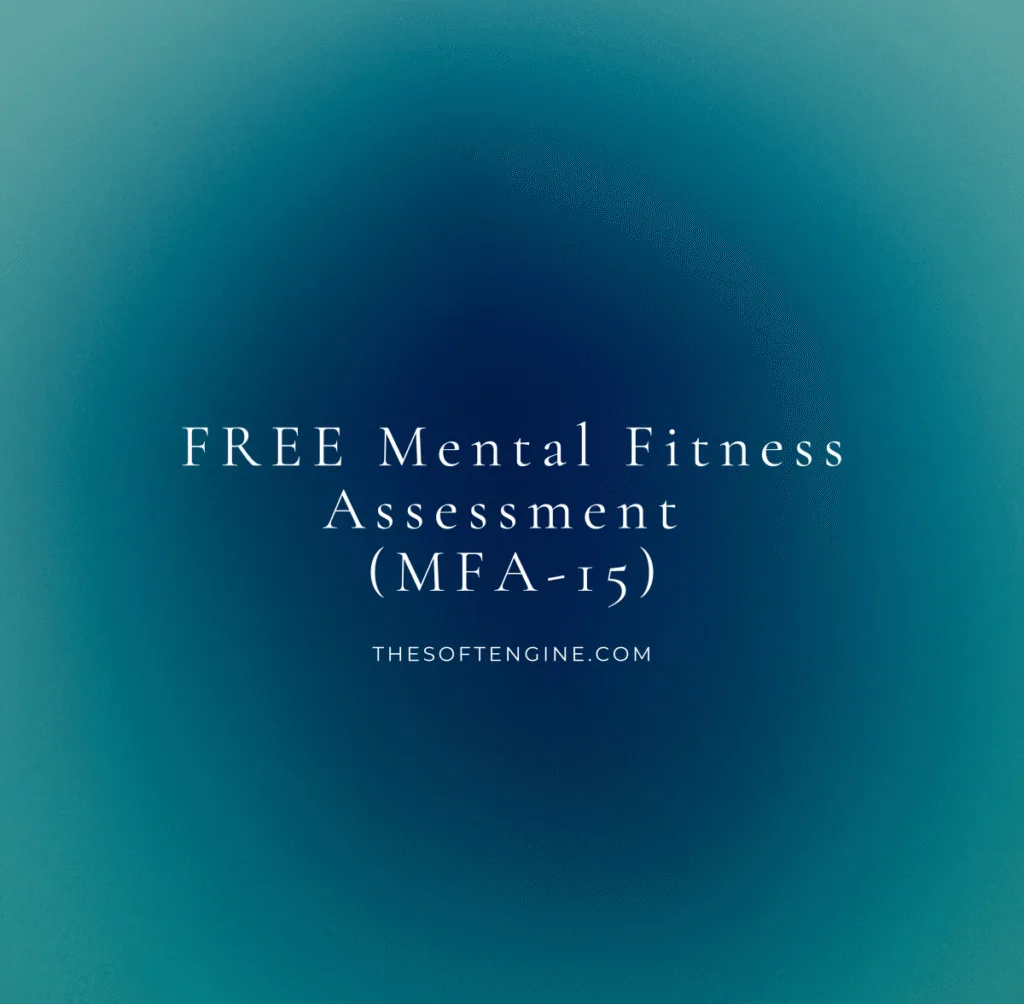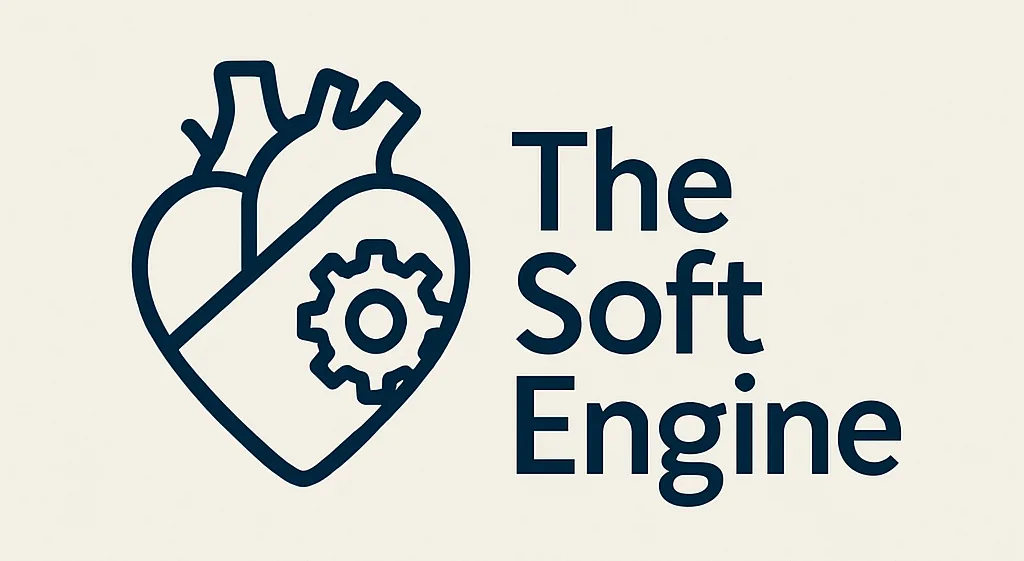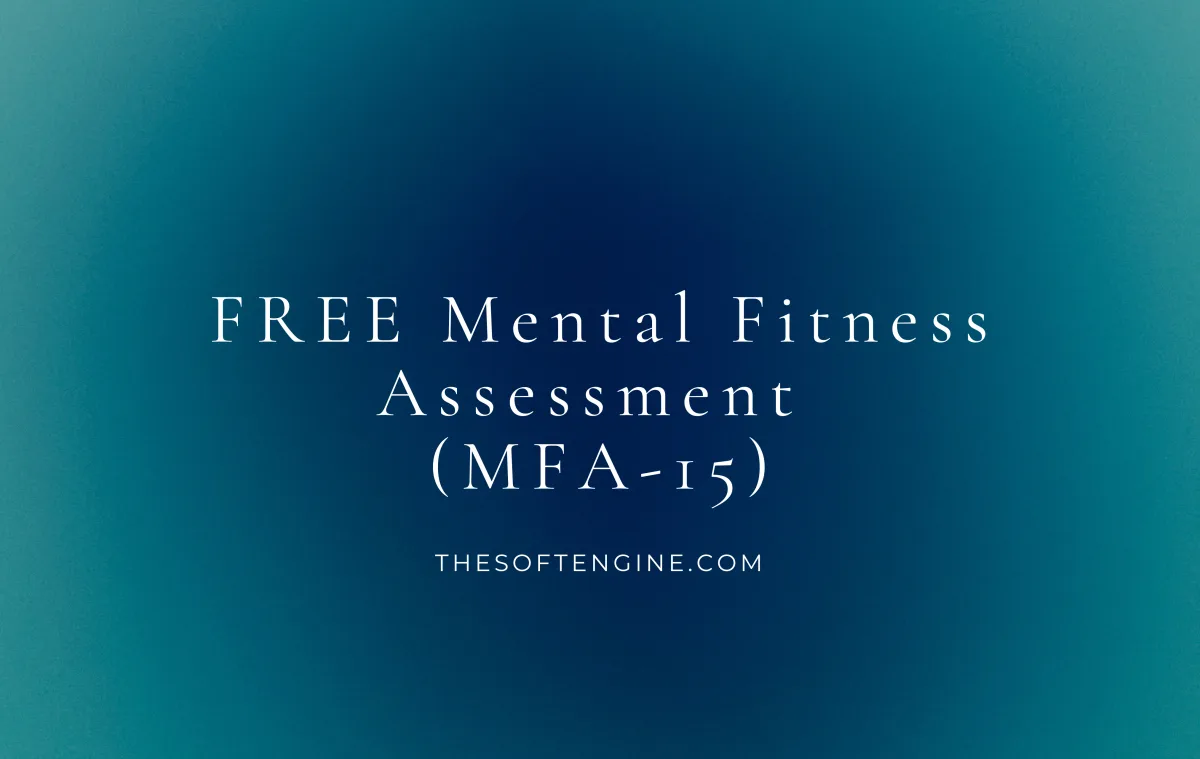Recalibrate Your Mind Like You Would Your Body
We all know the importance of exercising our muscles, but what about our mental “control system”? Focus, memory, adaptability, and resilience are just as trainable as physical strength.
The Mental Fitness Assessment (MFA-15) is a short, science-informed checkup designed to give you insight into how your mind has been performing over the past two weeks. It’s not about diagnosing you—it’s about spotting trends, building awareness, and giving you tools to grow.
This 15-item self-check draws on evidence from psychology and neuroscience, translated into plain English so you can use it in everyday life.
In less than 10 minutes, you’ll see which areas of your mental fitness are strongest, where you may need more recovery, and how small changes can boost your daily performance.
The Soft Engine Mental Fitness Assessment (MFA-15)
A short, science-informed check of the skills behind focus, adaptability, and everyday performance.
Mental fitness isn’t a diagnosis; it’s a training lens. This quick assessment checks five everyday skill areas—attention, working memory, cognitive flexibility, stress regulation, and resilience—over the last 14 days. You’ll get a simple score, domain insights, and practical next steps you can try today.
Instructions
- Answer for the past 14 days.
- Scale: 0 = Never, 1 = Rarely, 2 = Sometimes, 3 = Often, 4 = Almost always.
- Items marked (R) are reverse-scored.
- This tool is non-diagnostic. If your results worry you, consider speaking with a qualified professional.
How often in the past 14 days?
Your Mental Fitness Results
Mental Fitness Index (MFI%)
Attention & Focus
Working Memory
Cognitive Flexibility
Stress Regulation
Emotional Regulation
Note: Trends matter more than a single score. Re-test weekly or every two weeks.
What the Mental Fitness Assessment Measures
The MFA-15 looks at five core domains of mental fitness: attention, working memory, cognitive flexibility, stress regulation, and resilience. Together, these skills shape how you focus, adapt, and respond to life’s demands. Think of them as the mental equivalent of endurance, strength, and flexibility in physical training.
By scoring each domain, the MFA-15 gives you a clear percentage score (MFI%) and a color-coded band—from “Build the Base” to “Strong.” You’ll also get tailored guidance on next steps, from deep-work habits to stress resets. Unlike vague personality quizzes, this assessment is structured, repeatable, and trend-based—so you can track improvement over time.
How The Mental Fitness Assessment Works
Answer 15 quick statements about your last 14 days. Each one reflects a real-world skill, like returning to focus after distraction or bouncing back from setbacks. Your answers are scored on a 0–4 scale, and a simple formula turns them into both a total and domain-specific score. Within minutes, you’ll see your results displayed in a clean radar chart and a summary that highlights your strongest domain and your best area for growth.
You’ll also receive practical, evidence-backed recommendations. These aren’t abstract tips—they’re simple practices you can integrate immediately, like one 25-minute phone-free focus block, a short walk after meals, or the “two-plans” habit for building flexibility. Every suggestion is grounded in cognitive research but made easy to act on.
Why Take It Now
Mental fatigue builds quietly until it shows up in performance, mood, or even physical health. Regularly checking in with the MFA-15 helps you catch those dips early and adjust before burnout sets in. By tracking your score every week or two, you’ll see whether your habits—better sleep, daily movement, fewer interruptions—are actually improving your mental fitness.
It’s not about chasing a perfect number. It’s about watching the small upward trends that tell you your brain is recovering, strengthening, and adapting. And because the MFA-15 is non-diagnostic, you can use it as a safe, low-pressure starting point, whether you’re new to mental fitness or already experimenting with advanced tools.
A Note on Accuracy
The MFA-15 is designed to help you measure mental fitness in a simple, structured way, but it isn’t a clinical or scientific diagnostic tool. The questions are based on widely available research and public data about attention, resilience, stress, and cognitive performance—not on proprietary laboratory testing.
Think of it as a practical mirror: it reflects patterns in how you’ve been functioning over the past two weeks, giving you a clear sense of your strengths and where you may want to adjust.
If your results concern you, or if low well-being persists, it’s always worth checking in with a qualified professional who can provide deeper support.
Keep Building Your Mental Fitness
Taking the MFA-15 is only the first step. Mental fitness grows through steady training, just like physical health, and there are plenty of ways to strengthen it. Whether you want to understand the fundamentals or dive straight into daily practices, we’ve got resources to guide you.
Start with Mental Fitness 101 for a clear introduction to what mental fitness really means, why it matters, and how it shapes your performance. When you’re ready to put ideas into action, explore our Mental Fitness Exercises article for practical routines you can begin today. Together, these tools will help you turn your assessment results into real, lasting improvements in focus, resilience, and overall well-being.


